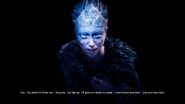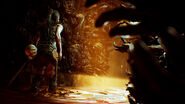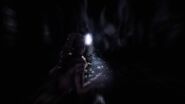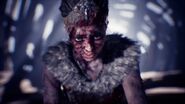- "Hello, who are you? ...It doesn't matter. Welcome. You are safe with me. I'll be right here, nice and close so I can speak without alerting the others. Let me tell you about Senua. Her story has already come to an end but now, it begins anew. This is a journey deep into darkness. There will be no more stories after this one."
- The Narrator
Senua is a Pictish warrior and the main protagonist of Hellblade: Senua's Sacrifice and Senua's Saga: Hellblade II. A young woman with a troubled life, exacerbated by severe psychosis, she initially finds herself on a personal journey into the depths of Helheim, in order to save the soul of her lover, Dillion.
Appearance[]
Senua is a young woman with fair skin, pale blue eyes and long dark brown hair. While Senua is slender, she is muscular and has light scars throughout her skin, some more notable on her face. Her hair is tied in a high ponytail and clumped together in plaits and locs coated in lime and adorned with beads. Senua and her people (the ones who lived in her village before abandoning it to the Northmen) were part of a people known as the Picts.
Hellblade: Senua's Sacrifice[]
In the time frame that the original game takes place, Senua wears distinctive woad blue face paint heavily around her eyes, her left arm, across her collar bones and her bottom lip. This type of paint and style has existed among the Pict tribes for centuries; the word "Pict" comes from Eumenius in 297 AD, meaning "the painted people". According to many Roman generals and Historians throughout their conquest of the British Isles, tribes like Picts and Iceni would cover themselves in blue paint to blend in the fog before the sun rose.
Senua wears a leather headpiece decorated with a large silver ornament set with blue stones at the front and stitched with triskelions (triple spirals) at the sides. She wears a simple plaid and leather outfit, consisting of detailed patterning on the chest, bare arms and a wolf fur collar fastened with a silver brooch. She wears a leather sword belt, carrying her sword at her left hip, a bag containing Dillion's head and a polished iron mirror that was given to her by Druth. This mirror is used to gaze into the otherworld. In her opening scene debut, Senua is covered in flecks of mud, dirt and blood.
Throughout the game, Senua's appearance changes; the blue woad on her body and face are almost washed off in her first encounter with Hela. Additionally, regardless of how many times Senua dies, the dark rot on her left arm continues to travel up her neck. As Senua's battle is both mental and physical, she endures injuries, such as a gash on her forehead and facial scars, by the end of the game.
[Focus]]. Her new outfit is based around a more common depiction of armour, though fashioned from multiple leather parts along her chest and shoulders that are held together by loops of metal. She also wears a thin strip of fabric around her right arm.
Characteristics[]
Personality[]
Senua exhibits a very reserved and somewhat meek personality, which stems from her years of isolation and abuse. While on her journey to Helheim, Senua has many experiences that cause her to panic or be afraid, such as when she is trapped in the dark or escaping an inferno. Despite the unpleasantness throughout the journey, she also displays dogged determination, pushing through treacherous landscapes and trials to reach her goal. Whenever she is threatened by an enemy, she readily draws her sword and faces them in combat. Senua is also capable of expressing anger and distress towards obstacles, often in her interactions with the Darkness.
Senua suffers from deep trauma originating from her early childhood, which began to escalate the early stages of her psychosis. Senua's psychosis manifests in both auditory, visual, and sensory hallucinations, leaving her constantly plagued by various female voices dubbed by the game devs as "The Furies". The voices are her guides; they serve as evasive thoughts, doubts, warnings, and even sometimes encouraging. Senua has a tenuous relationship with her voices, occasionally telling them to leave her alone, but she will also listen to their advice in combat and in solving puzzles. For most of the game, she sees the voices as part of a "curse," sometimes trying to fight it. In addition to her psychotic hallucinations, Senua suffers from delusions – a belief maintained even when firmly contradicted by reason or logic. Senua also interacts with her visual hallucinations even when she knows they may not be real, speaking to them when they manifest as people from her past.
Senua also suffers from depression and guilt caused by Dillion's murder, believing that it is her fault for Dillion's death due to her "darkness" inflicting the village. Ridden with this guilt, Senua decides to take his skull (which the Celts believed housed the soul) to Helheim in a desperate attempt to bargain for his soul, fueled by Druth's tales of the Northmen and their mythology. Senua obtains the dark rot from Hela, offering herself in place of Dillion. Through Druth's words, she goes through the gates of Valravn and Surtr, eventually through the trials of Odin to restore the god-killing sword, Gramr. Along her quest, Senua is forced to face the memories of her childhood, the abuse of her father, meeting Dillion, joining his group, and her eventual self-exile.
By the time Senua reaches the final door to Helheim, she has rediscovered a long, repressed memory of her father's fanatic beliefs that drove him to burn her mother alive to cure her of her "darkness". Senua's unyielding and loyal nature pushes her to the brink of death, remaining defiant to Hela despite her admission that she has "nothing else to give" to the goddess. It is then Senua learns to shed not only her guilt for Dillion, but to recgonize that what her father had raised her to think was a lie. And while Senua will always be plagued by her "darkness", she learns to say goodbye to Dillion and remembers what her mother has told her to look at the world with bright eyes. By this, Senua has come to accept that she cannot change her situation nor the fate of a loved one and continues on her quest, with seemingly the only real friends she has left, the voices.
History[]
Early Life[]
Senua's people, the Picts, originated from what is now known as Scotland. More specifically, Senua and her people originate from the Orkney Islands. While it isn't specifically stated in game, through Tameem's comments throughout the Dev Diaries, the player can assume that Senua is the last one of her village, avoiding clashing with the invading Northmen while exiling herself, before Dillion's death.
At a young age, Senua's psychosis manifested itself in visions that only she could see, an ailment she shared with her mother, Galena. Though Galena tried to show Senua that her "sight" was a special thing, her druid father, Zynbel, saw their conditions as "darkness", a curse from the gods that would doom them all. To appease those gods, Zynbel killed Galena by burning her alive when Senua was only five. Senua's trauma at witnessing the event caused her psychosis to worsen and repress the memory, leading her to believe that her mother took her own life to escape her darkness.
For the next few years of her life, Senua was kept inside her home and abused by Zynbel, both emotionally and physically. He would lock her away in a pit and belittle her condition in an effort to defeat the darkness. Senua was only allowed to leave her home on rare occasions to gather resources. On one of those rare rare outings, at the age of fifteen, Senua spotted Dillion practicing his swordfighting. In the following days, Senua began to practice swordfighting by mimicking Dillion's movements from a distance. One day, Senua mustered the courage to apporach Dillion and he took notice of Senua's sword skills, and the two became friends. Dillion also encouraged Senua to participate in the warrior trials, which she accepted. Both Senua and Dillion passed the warrior trials, and they grew closer. The two of them eventually fell in love, and Senua saw Dillion as her one ray of light in her darkness, her one hope in a world that seemed to conspire against her. With Dillion's encouragement, Senua decided to confront Zynbel about leaving with Dillion. Zynbel attempted to stop Senua from leaving, but Senua fended her father off with her sword and left for good, but not before Zynbel warned her that she would have blood on her hands, which Senua ignored.
After Senua left her home with Dillion, she started a new life as a warrior of Dillion's village. She lived many happy years with Dillion by her side. However, after a plague broke out in Senua's village and killed many, including Dillion's father, Senua began to wonder whether Zynbel was right about her condition being a curse.
Senua decided to journey into the Wilds in an effort to protect Dillion and overcome the darkness that plagued her. Out in the Wilds, she encountered Druth, an old scholar who was badly burnt in his attempts to escape his Northmen slave masters. The pair of them bonded as Druth told stories of his captors, giving life to their myths and lore through tales of Norse gods. Though he eventually succumbed to his wounds, he vowed to aid Senua in this life and the next for listening to his stories.
However, once Senua returned home, she found that her village had been attacked by the Northmen that Druth had warned her about. She discovered Dillion, sacrificed in a gruesome display of a "blood eagle" to the Norse gods and suffered a psychotic breakdown. Remembering the stories of the gods she was told, Senua reasoned that if she took Dillion's head to Helheim, the Norse realm of the dead, she would be able to bargain with its ruler, Hela, and win back his soul. There was nothing left for Senua but to journey north.
Hellblade: Senua's Sacrifice[]
After remembering Druth's instructions to reach the borders of Helheim, Senua finds herself on the outskirts and begins to venture in. As she travels further inside, she begins to remember pieces of her past, including her memories of meeting and spending time with Dillion as well as Druth's stories in order to overcome the obstacles that face her. At every turn, the voices of the Furies continue to both taunt and encourage her in a confusing contradiction. She is also pursued by an entity called the Shadow, a dark manifested voice that discourages Senua in her efforts to save Dillion, warning that it will always be with her. To unlock the bridge to Helheim, Senua is able to defeat the fire god Surtr and the god of illusions, Valravn, solving various problems in order to reach her two foes.
After this, Senua reaches the bridge to Helheim and is confronted by Hela herself. Senua's confidence wavers at seeing the source of her darkness, as a result, Senua's sword is shattered and she is knocked off the bridge. Barely surviving the encounter, Senua cauterizes a head wound and she has visions of Druth a man-shaped light, which she believes to be Dillion. She follows the light to a great tree, where a sword, Gramr, is stuck within it. Senua is informed by Druth that Gramr is said to be strong enough to kill Gods, such as Hela. To obtain it, She must complete the four Trials of Odin, which are related to her past.
Senua navigates through a labyrinth, navigates through darkness while being stalked by monsters, evades a fire monster in a swamp house, and solves puzzles in a tower. Upon completing all four trials, Senua removes the sword from the tree, which infuriates the Shadow, who casts Senua into an apocalyptic place called the Sea of Corpses, asserting that Senua is responsible for the death around her. After battling a large horde of Northmen, Senua escapes from the Sea of Corpses and starts heading back towards Helheim.
Upon entering the mountain where the bridge to Helheim is, Senua is stalked in the darkness by a new enemy. The Shadow informs Senua that the underground caverns in which she is navigating are home to a giant beast named Garm, which guards Helheim. Senua uses the light and torches to evade Garm, which only stalks her from the shadows. During this time, Senua loses Dillion's head as it falls into an abyss, at the center of the Beast's lair. Needing Dillion's head to ressurect him, Senua journies into the center of the monster's lair and faces it in single combat, emerging victorious after a long battle.
With Garm dead and the head reclaimed, the Shadow tells Senua that it has been trying to keep her from reaching Hela for her own safety, but believes she has fought hard enough to earn the right to see beyond the veil of the darkness. Leaving Garm's lair, Senua repairs the bridge to Helheim, which was left damaged at the previous encounter with Hela, and finally enters Helheim. The Furies do not want Senua to face Hela, fearing that they will die along with her, but Senua leaves them behind and enters Hela's sanctum.
As she enters, Senua realizes that the Shadow is her mind's manifestation of her father, continuing to abuse her even years after her village was attacked, and also learns the truth about her mother's death. As Hela herself speaks with the Shadow's voice, she charges through an initial onslaught of Northmen, as well as a shadow taking the forms of Valraven, Surtr, and Garm, to reach Hela. As Senua reaches Hela's platform, she summons an infinite amount of Northmen, preventing Senua from attacking her.
When Senua is eventually overwhelmed by her enemies, Hela kneels before her and takes her sword. Senua both curses and pleads with Hela, claiming she's not afraid of sacrificing her life to save Dillion but also begging to set him free. A whirlwind of emotions tears through her mind before finally, she tells Hela that if Dillion cannot be save, then she has nothing left to life for, so Hela should just kill her now. Hela obliges and impales Senua with her own sword. As Senua slumps to the ground, she recalls Dillion telling her of the importance of the acceptance of loss. Hela takes Dillion's head to the edge of the battleground and lets it fall into the abyss. As the camera pans back, Hela has become Senua and the corpse on the ground has the appearance of Hela instead.
With the guilt of losing Dillion finally lifted from her mind, Senua is able to accept that the voices in her head are not a curse or a darkness, but simply a part of who she is and that it didn't cause all the plague, Northmen invasion, or her mother's death. As the hellish imagery of Helheim fades away, Senua addresses the player, inviting them to follow her and her newly returned Furies as they have another story to tell.
Powers and Abilities[]
Powers[]
- Focus: Her condition gives her a capacity known as "Focus", referencing her tendency to view the world in a different light, which she can use in and out of combat. In combat, if she parries or dodges successfully enough time, she can use her focus ability to move faster than her enemies or dissipate the shadows some of them are made of, which makes them impervious to regular attacks. Her focus is also used to find runes in environments that will unlock doors or gates that bar her path.
- Time Reduction: Senua can use her focus and slow down all enemies around her for a limited time. during this time, Senua can move faster and inflict serious damage against her foes.
- Superhuman Speed: Senua can run and move at great speed when her focus has a single focus charge for the duration of the time reduction.
- Accelerated Perception: During the time deceleration, Senua is able to perceive everything in slow motion, allowing her to perceive what would normally be very quick to see and respond accordingly.
- Shadow Erasure: Senua is able to dispel the shadows from the enemies with her focus. she also dispel the shadows of Valravn, Surtr and Gramr.
- Time Reduction: Senua can use her focus and slow down all enemies around her for a limited time. during this time, Senua can move faster and inflict serious damage against her foes.
- Supernatural Senses: Because of her condition, Senua can see and sense things beyond a normal human.
- Enhanced Vision: Senua is able to see and understand things that the human eye is not able to see. Allowing her to solve puzzles and find hidden paths. She sees in detail and clearly identifies runes that she needs to decipher to open sealed gates. Senua can also rebuild fragmented bridges and stairs.
- Supernatural Detection: Senua is able to sense and detect supernatural phenomena and entities. She detected and sensed Hela's presence through her darkness after trying to open the Gate to Helheim. Senua sensed and gained a short understanding of Valravn and Surtr's powers before facing them in their domain.
- Anger Empowerment: In the final battle, Senua became much stronger when she realized how much her father abused her and her mother.
- Enhanced Strength: Through her fury and rage, Senua was able to eliminate the Northmen with just one blow.
- Enhanced Durability: Senua has become much more durable than normal. Being able to withstand blows from his enemies and quickly get up in sequence.
- Enhanced Reflexes: Senua's reaction times are faster than normal. As she constantly hears voices, the furies can warn when an enemy will try to attack Senua from behind unawares, causing her to successfully dodge all attacks from the Nords. Focus magnifies Senua's reflexes.
- Peak Human Stamina: Senua possesses stamina superior to that of a normal human, being able to fight and run for longer without tiring.
- Memory Manipulation: Senua is able to manifest and project memories of individuals during specific parts of the game. She can learn more information about the lore of the Northmen or notice small details that can help her during her journey. When using her focus on the lorestones, she triggers a memory of Druth telling her about the Northmen's mythology.
- Memory Projection: Senua is able to create holographic projections with the contents of certain memories in her mind. After finding the hidden path, Senua was able to seamlessly unconsciously project a memory of Druth. her focus on the lorestones, she triggers a memory of Druth telling her about the Northmen's mythology.
- Immortality Negation: Senua is able to kill gods and god-like beings. She killed Valravn and Surtr before gaining the sword, implying she is able to kill gods by herself.
- Gramr Sword Capabilities: Gramr has the same capabilities as Senua's original sword, with a few exceptions. Senua is able to charge her heavy attack to deal extra damage to enemies, though this leaves her vulnerable to attack for a short window. If she parries the attack of an enemy covered in shadow, she will bring it out of the shadow much as she would if she were using her focus.
- Shadow Erasure:As a legendary weapon created by Odin, Gramr is able to dispel the shadows of enemies. Its strong light is also capable of dispelling the shadows of Valravn, Surtr, Garm, and the Northmen.
- Immortality Negation: Senua is able to kill gods and god-like beings. She killed Valravn and Surtr before gaining the sword, implying she is able to kill gods by herself.
- 4th Wall Awareness:: Senua was able to break the invisible barrier of the fourth wall of her universe in some moments of the game and speak directly with the players of Hellblade.
- Regenerative Healing Factor: Senua has a healing factor far superior to that of any human, causing her to heal from blows exponentially while in battle. In the final scene of the game, Senua was able to completely heal from the Dark Rot.
Abilities[]
- Adept Warrior: Senua is an adept warrior, despite essentially being self-taught. She is capable of quick and heavy attacks, parrying and dodging, and can kick an enemy to prevent it from blocking her attacks. She can also charge an opponent to either get closer or directly attack or kick it.
- Voices: Senua constantly hears voices in her head, which provide her with information, guidance, and even clues. They also affect her perception of reality and her decision-making.
- Sword Mastery: Despite having learned to fight with swords just by watching Dillion, Senua has complete mastery of her sword skills, being able to cause powerful attacks against her enemies.
- Parry: Senua is able to parry enemy attacks, allowing her to quickly counterattack against them.
- Indomitable Will:: Senua has an incredible willpower and determination which cannot be broken by anyone, once she decides to Helheim to save Dillion's soul. Senua determined her indomitable will before facing every boss in the game.
Weaknesses[]
- Psychosis : Suffers from a form of Psychosis and schizophrenia which she has lived with her whole life and was passed down by her mother, Galena. Traumatized by her father's treatement after he locked her. Vulnerable to Fire and Darkness. Pursued by an entity called the Shadow, a dark manifested voice that discourages Senua in her efforts to save Dillion though she managed to overcome it in the end.
Equipment[]
- Iron Mirror: Senua is able to use the iron mirror in combat, each time she gains enough focus with the successful attack and defensive measure that Senua takes. When she gains enough focus, the mirror on her hip will flash and give her a single focus charge, up to a maximum of three. If Senua's focus load is at maximum (with each mirror symbol illuminated), the slow down time will be longer.
Weapons[]
- Gramr Sword: Gramr is the legendary sword forged by Odin and gifted to Sigmund, later used by Sigurd to kill the dragon Fafnir. It is the sword that Senua is tasked with reforging (through completing several trials) so that she can use it to defeat Hela.
- Senua's Sword: Senua's Sword is the original weapon Senua uses in combat.
Senua's Saga: Hellblade II[]
TBA
Gallery[]
Trivia[]
- It is unclear how much of Senua's journey is actually real and how much of it is based in the psychotic delusions of her mind. Though there are supernatural elements at play, all of Senua's experiences are based on her interpretations of the Norse stories that Druth told her. The ending scenes seem to symbolise that Senua has come to realise that her psychosis is not a curse, but an illness that she must learn to deal with and the fantasy of confronting the gods fades as she does so. If the player pays close attention, they will notice Hela in the place of Senua.
- Senua could also have a deep fear of becoming like her mother, in regards to the visual presentation of Hela. In Norse mythology, Hela is described as half-rotting, however in Hellblade, Hela is half-burned. When Senua comes to realize the truth of her mother, Galena's face is half-burnt and her mother's voice speaks through Hela as she drops Dillion's head into the sea below.
- Druth refers both to he and Senua as geilts. This is another Irish term and it refers to a person that goes mad from terror or has seen too much battle. Geilts are outsiders among their community, said to have control over illusion, prophets, or seers. The term can also refer to birds (which explains why Druth is wearing feathers). A geilt is definitely not out of the norm for the Celts; other geilts in Celtic legends are Mad Sweeny and Merlin. Merlin, especially, who's Welsh counterpart, Myrddin Wyltt, a madman who lived in the forests and possibly a druid and bard.
- Senua's namesake comes from a recently discovered ritual spring, a Romano-British goddess who bares the same name. her name is possibly related to the Proto-Celtic 'seno' meaning "old". Some academics have associated the name to the ancient river Senua that was once located in southern Britain, which may have also been known as Alde, from the Anglo-Saxon 'ald' meaning old.
- Senua is performed by Melina Juergens, Ninja Theory's video producer. While the developers were searching for an actress for the role of Senua, they simultaneously had Melina test out the motion capture technology and act out Senua's lines until they decided to use her instead. She had no acting experience prior to this.







